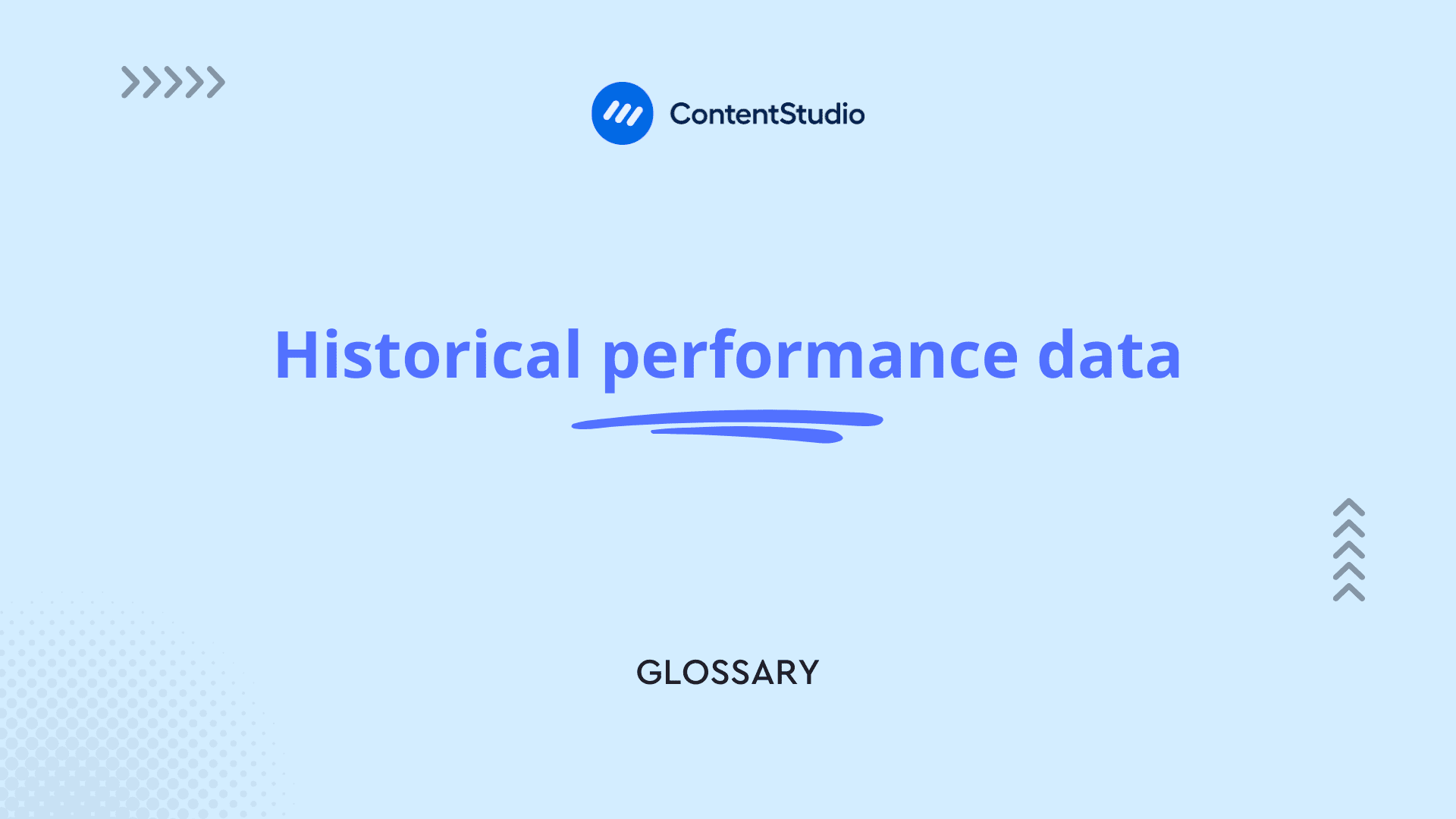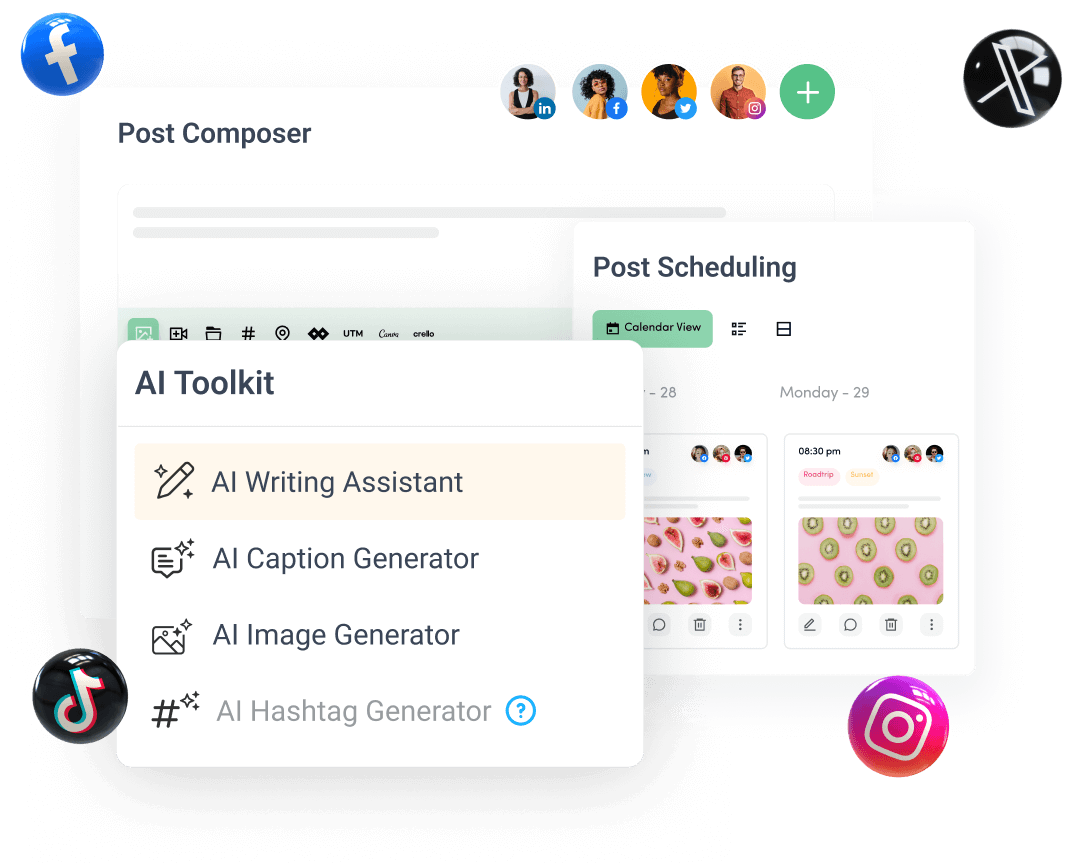🚀 Introducing Contentpen – Your AI-Powered content assistant!Join the waitlist.
Historical performance data

What is historical performance data?
Historical performance data represents a comprehensive collection of past metrics, analytics, and engagement statistics that help businesses and marketers understand how their content and campaigns have performed over time. This data serves as a foundation for making data-driven decisions and optimizing future marketing strategies.
Why is historical performance data important?
Understanding historical performance data is crucial for any social media marketing strategy. It provides valuable insights into what has worked in the past and what hasn't, allowing marketers to:
- Track progress and growth: Monitor how your social media presence has evolved over time and identify periods of significant growth or decline
- Identify patterns and trends: Recognize seasonal trends, peak engagement times, and content preferences of your audience
- Make informed decisions: Base future content and campaign strategies on concrete data rather than assumptions
- Optimize resource allocation: Determine which platforms and content types deliver the best ROI
- Demonstrate value: Show stakeholders the tangible results of your marketing efforts through comprehensive social media analytics
Key components of historical performance data
Engagement metrics
Engagement metrics form the core of historical performance data, showing how your audience interacts with your content. These metrics include:
- Likes, shares, and comments: Basic interaction metrics that indicate content resonance
- Click-through rates: The percentage of people who clicked on your links or calls-to-action
- Reach and impressions: The number of unique users who saw your content and how many times it was displayed
- Audience growth rate: The speed at which your follower base grows over time
- Social media engagement rate: How effectively your content resonates with your audience
Content performance metrics
Understanding how different types of content perform helps in content planning and creation. Key metrics include:
- Post engagement by type: How different content formats (images, videos, text) perform
- Best performing topics: Which subject matters resonate most with your audience
- Posting time effectiveness: Which posting schedules generate the most engagement
- Content longevity: How long your content remains relevant and engaging
- Platform-specific metrics: Unique measurements for each social media platform
Audience insights
Historical audience data helps you understand who your content reaches and how they behave. This includes:
- Demographic information: Age, location, gender, and other relevant characteristics
- Online behavior patterns: When your audience is most active
- Interest categories: Topics and themes that interest your followers
- Language preferences: Which languages your audience uses most frequently
- Device usage: How your audience accesses your content
How to analyze historical performance data?
Setting up tracking systems
Before you can analyze historical data, you need proper tracking systems in place. This involves:
- Implementing analytics tools: Setting up comprehensive analytics and reporting tools to track all relevant metrics
- Defining key metrics: Identifying which metrics matter most for your business's social media goals
- Establishing baseline measurements: Creating reference points to measure progress
- Setting up automated reporting: Implementing systems for regular data collection and reporting
- Ensuring data accuracy: Regularly verifying that tracking systems are functioning correctly
Data interpretation techniques
Making sense of historical data requires systematic analysis:
- Content insights: Understanding the performance patterns of your content
- Comparative analysis: Comparing performance across different time periods
- Segmentation: Breaking down data by various factors like content type or audience segment
- Correlation analysis: Understanding relationships between different metrics
- Anomaly detection: Identifying unusual patterns or outliers that require attention
Using historical performance data for future success
Strategy optimization
Historical data helps refine your marketing strategy by:
- Content optimization: Using past performance to improve future content
- Audience targeting: Refining your targeting based on historical engagement patterns
- Resource allocation: Distributing resources to the most effective channels and content types
- Campaign planning: Using past campaign data to improve future initiatives
- Performance forecasting: Making educated predictions about future performance
Implementation in content creation
Apply historical insights to create engaging content:
- Content ideation: Using past performance to generate new content ideas
- Format selection: Choosing the most effective content formats
- Social media calendar: Planning and scheduling posts at historically optimal times
- Message refinement: Crafting messages that resonate based on historical engagement
- Visual element selection: Choosing engaging images for social media that have proven to be successful
Tools and technologies for tracking historical performance
Analytics platforms
Various tools help track and analyze historical performance:
- Native platform analytics: Built-in analytics tools from social media platforms
- Third-party analytics tools: Comprehensive solutions for cross-platform analysis
- Social media management tools: Platforms that combine publishing and analytics
- Data visualization tools: Solutions for presenting data in accessible formats
- Automated reporting systems: Tools that generate regular performance reports
Data storage and management
Proper data management is crucial for historical analysis:
- Data organization: Structuring historical data for easy access and analysis
- Storage solutions: Implementing secure and accessible data storage systems
- Data backup: Ensuring historical data is properly preserved
- Access control: Managing who can view and analyze historical data
- Data integration: Combining data from various sources for comprehensive analysis
Best practices for leveraging historical performance data
Regular analysis and reporting
Maintain consistent analysis practices:
- Schedule regular reviews: Set up periodic analysis of historical data
- Create standardized reports: Develop consistent reporting formats
- Share insights: Communicate findings with relevant team members
- Track progress: Monitor improvements based on historical insights
- Update strategies: Regularly refine approaches based on historical data
Data-driven decision making
Use historical data to inform decisions:
- Set realistic goals: Base objectives on historical performance
- Validate strategies: Test new approaches against historical benchmarks
- Allocate resources: Distribute resources based on historical ROI
- Measure success: Compare current performance to historical metrics
- Adjust tactics: Modify approaches based on historical insights
Common challenges and solutions
Data accuracy and consistency
Address common data issues:
- Data validation: Regularly verify data accuracy
- Standardization: Maintain consistent measurement methods
- Error correction: Identify and fix data collection errors
- Platform changes: Adapt to social media platform updates
- Technical issues: Address tracking and reporting problems
Resource limitations
Overcome resource constraints:
- Content automation: Implement automated tracking and reporting
- Prioritization: Focus on the most important metrics
- Tool selection: Choose cost-effective analysis solutions
- Training: Develop team skills for data analysis
- Outsourcing: Consider external expertise when needed
Future trends in historical performance data
The field continues to evolve with:
- AI in social media management: Advanced algorithms for deeper insights
- Predictive analytics: Better forecasting based on historical data
- Real-time processing: Faster data analysis and reporting
- Enhanced visualization: More intuitive ways to present data
- Integration capabilities: Better connection between different data sources

Create, plan, schedule, and publish posts on all social media networks




